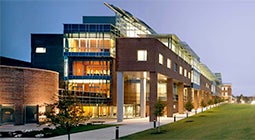All Ph.D. students are eligible for a Certificate in Biomolecular Science and Engineering as long as they complete the core requirements (A1 to A7 and A11; see below) of the Biomolecular Science and Engineering Training Program at Rensselaer.
Trainees in the Biomolecular Science and Engineering Training Certificate Program are required to partake in a number of courses, structured activities and research experiences which are designed to further their careers in biotechnology.
Students:
Training Certificate Program Enrollment Form
Trainees:
Progress and Outcomes Report
A1: A core course entitled “Perspectives in Biomolecular Science and Engineering” that serves as a crosscutting and unifying course for the Training Program is required for all trainees (taken each year of their Ph.D. training) and is cross listed among all four departments.
A2: One course in each of the three broad categories covering the five training areas of Biomolecular Science and Engineering and a course in data science that maximizes didactic training among the key disciplines. Trainees have crossover course requirements (that is students must take courses outside of their own major such that biologists and chemists take bioengineering courses and engineers take molecular biology and biochemistry courses). The data science and data analytics courses provide opportunities to understand how quantitative engineering and computer science methods can be seamlessly integrated into fundamental biological studies.
A3: Entrepreneurship and Commercial Translation Experience. Each trainee will attend a day-long technology commercialization boot camp at the RPI Office of Intellectual Property Optimization (IPO) to learn about fundamentals of intellectual property, patent search, patent filing procedures and associated market research. Trainees may also participate in the 3-step entrepreneurial program at the Severino Center for Technological Entrepreneurship at Rensselaer where they pitch a commercial idea, conduct market research.
A4: Trainees will attend a high-profile series, “Frontiers in Biotechnology” that provides immersive and interdisciplinary exposure to contemporary research in academia and industry (separate series). This seminar series is separate from individual departmental seminars.
A5: CBIS Student Seminar Series. Trainees organize and attend this seminar series. It gives trainees a greater appreciation of different research projects, address contemporary issues and enhances their training experience.
A6: Exposure to enrichment activities about human health, physiology, and disease. The Training Program participates in myriad seminar series/enrichment activities with the Icahn School of Medicine at Mount Sinai (Health Hackathon), the University at Albany (Life at the Interface of Science and Engineering (LISE) Lecture Series) and the Albany Medical College (such as the Albany Medical Center Prize Lecture). It exposes trainees to cutting-edge research about the development and application of biomolecular and cellular function to impact human health, physiology and diseases. Trainees will attend the aforementioned seminars. Each year, trainees will participate in the 48-hour Health Hackathon at ISMMS which promotes the healthcare innovation and entrepreneurial ecosystem.
A7: Trainees will participate in the Annual Retreat in biomolecular science and engineering. Here, trainees and others on campus interact with outside researchers in the field and hold breakout sessions in contemporary research areas and careers in biotechnology.
A11: A dedicated course in the area of responsible conduct of research (entitled “Ethical Considerations in Biotechnology”), as well as eight online modular units, developed through an NIGMS Administrative Supplement on curricular or training activities in Rigor and Transparency to enhance Reproducibility are mandatory for trainees.
